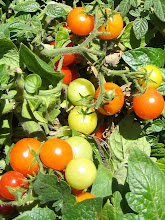Joel is a very charasmatic farmer and a great communicator from the USA. His farm focuses on growing pasture. His family have taken a degraded landscape that had lost significant amount of topsoil and turned it into a lush farm supporting (or supported by) various animals. The animals are allowed to express their natural behaviour which in turn regenerates the landscape. For example, birds in the wild tend to follow herds and thereby reduce parasites. Hence, the chickens follow the cattle around the paddock on rotational grazing, scratching through cow pats and eating bugs. Pigs love rooting things up, so the pigs turn dropped hay, cow manure and sawdust into compost while looking for the corn that has been sprinkled through it in layers over the very few weeks the cows are fed hay in the shed.
On the first day, Joel took us through the various elements of Polyface Farm:
- Salad bar beef
- Pasturised poultry (chicken eggs and meat, turkey)
- Pigaerator pork
- Forage-based rabbit
- Forestry
Integrate rather segregate is one of the permaculture principles that Joel is excelling at. It has really made me think about including a substantial pasturised poultry enterprise at my plot because a) animals offer such an invaluable environmental service in fertilising and pest control and b) there is money in it.
The second day was on marketing and who is going to do the work. Joel's focus is on selling direct and local. This is all about creating local jobs. Selling direct also means the farmer gets a good price for the produce (I have been told five to one is the common ratio between retail price and the price the farmer gets). Hence the oft quoted line "there's no money in farming", which hardly entices the next generation to keep on the farm. Plus so many farmers are having to supplement their income by working off farm.
I was impressed by the Metropolitan Buying Clubs. Similar to a Community Supported Agriculture scheme, but with more flexibility. Orders are delivered to various hubs eight times a year. Each hub has a hostess who simply provide their house as a drop point and they just need to make sure a minimum order level is acheived across the members. Polyface has increased the number of products they offer, sourcing extra items from like minded farmers at the price the farmer sets. I'll ponder if I can use this model for my business, rather than a set box per week (though it will be different as I will mainly have fresh vegetables rather than frozen meat).
Finally, Joel touched on an aspect close to his heart: including, and creating jobs for, his family. This means being creative in devising new enterprises where each person in the family and their spouse has a role that allows them to express their strengths. The Salatin family have also opened up their farm to interns and apprentices. Leasing rather than buying farms was advocated as an economical way to commence farming.
Planning for succession was an important topic many in the audience had not yet fully dealt with. Nor has my family. The moral of the story: better to find out sooner what will happen with the farm than when you are 50 years old.
I left the workshop optimistic that food grown organically and sold locally was both possible and profitable. The title of Joel's book rings in my ears as a mantra "You Can Farm".






No comments:
Post a Comment